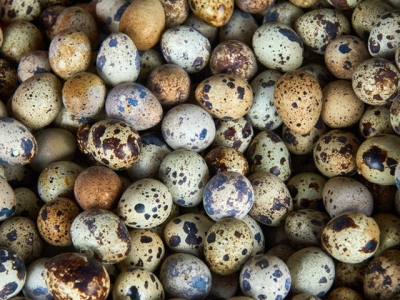Adding curcumin to quail diets may boost production, cold stress response
Supplementing the diets of farm-raised quail with curcumin may improve production, egg quality and fatty acid profile for birds facing cold stress, researchers
 European project set to improve hen welfare
European project set to improve hen welfare A European-wide project to improve the conditions of egg-laying chickens was launched Oct. 4 under the umbrella of the ChickenStress European Training Network
 Black soldier fly tech aims to simplify, specialize production
Black soldier fly tech aims to simplify, specialize production New technology developed to store, and transport black soldier fly larvae seeks to address producer challenges and help specialize
 Ambitious, $10m grant to transform poultry nutrition, water use
Ambitious, $10m grant to transform poultry nutrition, water use Poultry science research grant, co-led by University of Arkansas and Cornell, is among largest ever awarded by USDA.
 US, Pakistani researchers team up to design antibiotic-free poultry support
US, Pakistani researchers team up to design antibiotic-free poultry support An international research partnership is seeking to reduce the reliance on antibiotics by developing novel alternatives using a combination of bacteriophage
 Antimicrobial resistance intensifies in low-, middle-income countries
Antimicrobial resistance intensifies in low-, middle-income countries Low- and middle-income countries have limited surveillance capacities to track antimicrobial use and resistance on farms
 Understanding salmonella entryways in poultry may improve interventions
Understanding salmonella entryways in poultry may improve interventions Aerosolization found to also be important route for salmonella colonization and potential spread throughout a poultry house.
 Is inflammation control key to antibiotic-free poultry?
Is inflammation control key to antibiotic-free poultry? Managing inflammation will be increasingly important for successful antibiotic-free poultry production, but more work is needed to ensure interventions
 Black UV light may improve poultry house air quality
Black UV light may improve poultry house air quality Gaseous emissions are an unwanted side effect of poultry production, and it is essential to mitigate ammonia and other gaseous emissions to increase industry
 Broilers, turkey see fewer antimicrobials at hatch, in feed
Broilers, turkey see fewer antimicrobials at hatch, in feed The amount of antimicrobials added to the feed and water of broiler chickens and turkeys fell in the US from 2013 to 2017.
 Post-hatch feed and broiler performance
Post-hatch feed and broiler performance The first seven days of life are increasingly important as broilers reach slaughter weight at an ever younger age.
 Novel technology to target resistant pathogens in poultry
Novel technology to target resistant pathogens in poultry A new treatment to control the spread of antibiotic-resistant pathogens in poultry will be developed by researchers in the U.K. and China
 Many backyard poultry enthusiasts not following proper hygiene
Many backyard poultry enthusiasts not following proper hygiene Passive surveillance project uncovered presence of certain worrisome pathogens in backyard raises concerns for poultry health specialists.
 Low vitamin D levels? Shine a black light on some chickens
Low vitamin D levels? Shine a black light on some chickens A lack of vitamin D is very common, despite the vitamin being present in eggs, some dairy products, and even sunlight at least
 Genealogy of important broiler ancestor revealed
Genealogy of important broiler ancestor revealed Further analyses may reveal more about importance of genetic drift and selection in closed populations.
 Strategy to reduce the immunotoxic effects of aflatoxins in broiler chicks
Strategy to reduce the immunotoxic effects of aflatoxins in broiler chicks Diet supplementation with mannanoligosaccharide (MOS) improved immunological responses and increased humoral immunity in aflatoxin-challenge broilers,
 Marek's disease genome study may aid control in poultry
Marek's disease genome study may aid control in poultry Study illustrates how easily virulent Marek's disease viruses can persist and spread, but new strains do not appear to be more virulent than older stains.
 Brazilian ginseng may boost poultry feed efficiency, egg shelf life
Brazilian ginseng may boost poultry feed efficiency, egg shelf life Supplementing sorghum-based quail diets with Brazilian ginseng may improve bird feed efficiency and lengthen the shelf life of eggs, say researchers.
 Perinatal imprinting in poultry benefits performance
Perinatal imprinting in poultry benefits performance Mounting evidence shows that what chicks are fed around the time of hatching influences a bird’s performance and its nutrient requirement in later life.
 Ducks require more choline than broilers
Ducks require more choline than broilers Choline dietary specifications for broilers are lower, indicating once more that ducks should not be treated as broilers in terms of feed formulation.
